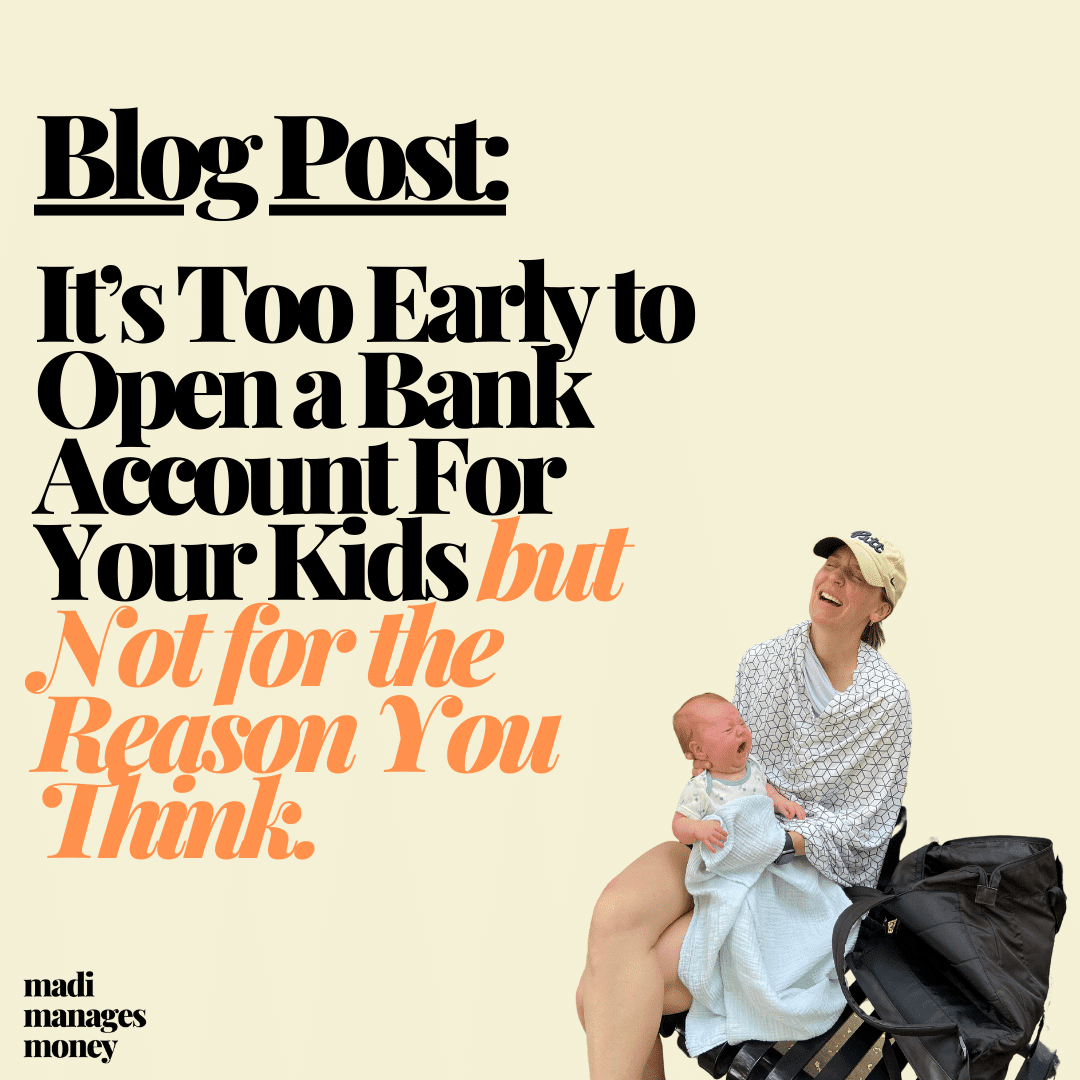It’s too early to open a bank account for your kids, but not for the reason you think.
Checks from nana. Cash from the aunties for birthdays. Friends and families are nothing short of generous when a new addition joins the ranks.
One of the most common financial mistakes parents make for their children is simply saving gifted money in a bank account for them until they’re old enough to use it. It might not sound like a mistake at all, making it all the more pervasive.
This post explains the opportunity cost of doing so and what you might consider instead, especially if your kids are young.
If I manage to convert you to investing-curious🙏, I’d invite you to watch this free recording of the Investing for Kids module of my digital course, the Family Financial Planning Masterclass. The Masterclass is like Lamaze for your finances.
A bad magic trick: My brief tutorial on how to turn $1,000 into $596.
Now, you might be saying to yourself, “Storing money in a savings account doesn’t sound so bad, Madi!”
Well, it’s the opportunity cost that’ll getcha. A lot can happen in 18 years, and here’s an example.
Let’s pretend your baby is gifted a total of $1,000 for their first birthday. You plan to give it to them in 17 years when they turn 18.
If you kept the money in a checking or savings account at a bank, and inflation clocked in at about 3% per year (which is in line with long-term historical averages), your child’s $1,000 would be worth more like $596 when they reach 18.
Yes, their balance will still read $1,000, but it will only hold $596 worth of value. I think this is what makes inflation confusing. Just remember the prices of all the things we need to buy go up over time, but dollars in your bank account are stagnant. They don’t get more valuable.
Now, if you’ve ever spent more than four minutes with me, you can guess where I’m going next. (I am who I am.) What if you invested the birthday money instead?
If you invested the $1,000 in a low-cost stock market index fund for the next 17 years, your child could end with more like $3,159. This assumes you were able to earn a 7% annual return. You just created $2,563 of value.
Note that both sides of this example consider inflation. I like to use a 7% return for projections, because this is roughly in line with what the U.S. large cap stock market has returned over the long haul after you subtract what was lost to inflation.
This is a modest example, but you can see how the delta between sitting in cash vs. investing can really add up. As a matter of fact, it compounds.
The dispersion between these your two choices would be even wider if:
- You waited longer to gift the invested money
- Future stock market returns were higher than long-term averages
- You started with a larger beginning balance
In these scenarios, investing for your children becomes even more powerful!
I’m scared I’ll lose their money if I invest it.
Here’s where you’re right: there’s no guarantee that by investing your children’s money you will actually generate a positive return. There’s always a chance you could lose money.
But, I’d like to offer you some historical probabilities on this actually happening. Here’s what the last 50 years (from 1972 to 2022) of investment performance of S&P 500 Index has to say.
The chart shows the probabilities that investors lost money based on how long they chose to leave their money invested.

Source: Yahoo Finance, S&P Dow Jones Indices
Yes, you’re reading the chart right.
If you bought an S&P 500 Index fund and held it for 15 years on any day from 1972 to 2022, you had a near 0% chance of losing money. There were virtually no instances in which you came out in the red, even if you picked *the* absolute worst days to make your investment.
Investing for short periods of time is a different story.
If you bought an investment and sold after just one year, you would have lost money about 25% of the time. If you sold after just one month, the probability of losing money soared to nearly 40%.
Make no mistake about it – short-term investing in stocks is akin to gambling. This means that if your child is approaching the age at which you might give them their bag (and they’re gonna spend it), investing purely in stock index funds probably isn’t the move.
The bottom line is this: The longer you can leave your money invested, the less likely you are to lose money. As demonstrated by the steeply downward-sloping line in our chart, if you’re investing for your children for the long-term, it’s probably a risk worth taking.
I’m investing-curious. How do I start?
Assuming this is money gifted to your kids that you’re investing on their behalf, I’d explore a 529 plan or an UTMA/UGMA account.
529 plans are investment accounts that incentivize you to save for college with tax savings.
These tax perks come in the form of:
- A state income tax deduction during the year you contribute to the account
- Tax-deferred investment growth
- Tax-free withdrawals for qualified education expenses
Some parents are reluctant to save in a 529 plan in case their child ends up not needing the money for college tuition. Frankly, this is an outdated notion. Today, 529s offer impressive flexibility, especially if you open your child’s 529 account while they’re young.
Should they not use the money for college tuition, you’ll be able to roll it over into a Roth IRA in their name. In short, “getting trapped” in a 529 account should be a smaller concern for parents than ever before.
Plus, I like the odds that most of our children are going to need to pay for some formal education in their future. A 529 gives them more options and can help them offset the cost.
Most parents open up a 529 account with your state’s 529 plan. To see how your state’s 529 stacks up against others, here’s some independent research by Morningstar.
If your state isn’t listed as a Gold, Silver, or Bronze medalist, you can always open a 529 with another state. Utah and Michigan are two strong investment plans, and you don’t need to live in those states to open an account.
UTMA/UGMA accounts function as taxable investment accounts you open for your child. They’re often referred to as “custodial accounts.”
You don’t get any special tax benefits for using one, but the nicest feature about the UTMA/UGMA is that your child could eventually use the money for anything. It doesn’t have to be solely for college. (This is the only nice thing I have to say.)
I’m not a huge UTMA/UGMA fangirl otherwise. Here are my two hang-ups:
- No go backsies. 🔙 Any money you contribute to an UTMA/UGMA cannot be undone. It will be fully under your child’s control when they reach 18 or 21, depending on the age of majority in your state. No matter what happens between now and adulthood, your course is predetermined the moment you contribute. (Dramatic, right?)
- Financial aid. 👎 UTMA/UGMA accounts are viewed less favorably than 529 accounts for financial aid purposes by FAFSA. If your child does attend college, UTMA/UGMA assets can reduce the federal aid they would’ve otherwise qualified for by 20% of the UTMA/UGMA account value. 529 account assets are viewed more favorably, only reducing potential federal financial aid by 5.64% of the 529 account’s value.
In summary, I think you’re giving up too much control by opting for the UTMA/UGMA that you’d keep with the 529 plan.
Babies & young children have oodles of time.
Money is best kept in places like checking or savings accounts when you plan to use it in the next two years. Unless your child will use their gifted money this soon, investing it is the move.
Bank accounts might *feel* safe, but you can kiss your kid’s purchasing power goodbye to inflation if you keep money in one for too long. The past two years are a testament to this.
To maximize the amount of money you ultimately hand over to your kids, get it invested as early as possible. Most stock markets trend up over long periods of time despite what the 24-hour news cycle might make you think.
Your decision isn’t riskless, but the data, research, and probabilities are in your (and your child’s) favor.
The opinions voiced in this material are for general information only and are not intended to provide specific advice or recommendations for any individual. To determine which investments may be appropriate for you, consult with your financial advisor.

